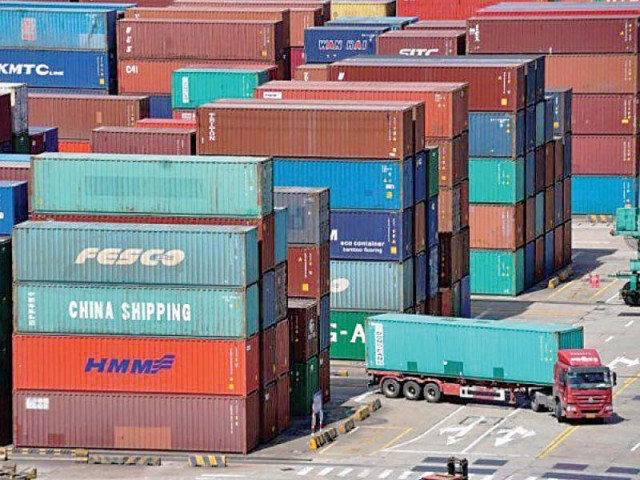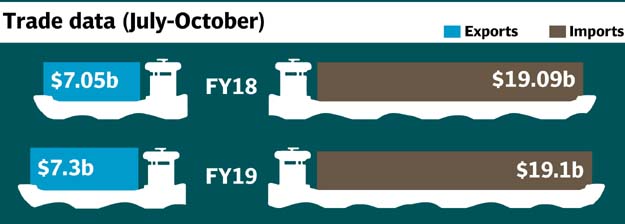Jul-Oct FY19: Trade gap narrows to $11.8b as imports stay static
Exports rise modestly despite a hefty fall in rupee’s value

Pakistan does not have exportable surplus and there is a high probability that the country will avail itself of the $1-billion Chinese facility by exporting additional quantity of rice and some other agriculture produce. PHOTO: FILE
The $11.8-billion deficit, recorded in July-October FY19, was nearly 2% or $237 million lesser than the same period of last fiscal year, the Pakistan Bureau of Statistics (PBS) reported on Friday.
Exports in the July-October period increased 3.52% to $7.3 billion. In absolute terms, the export receipts rose $248 million, but the pace of increase was slower than the preceding year.
The value of imported goods stood at $19.1 billion, which was only 0.6% or $11 million higher than the import bill in the corresponding period of previous fiscal year.
Exports of goods were 261% less than the value of imports. Imports of the country have started to ease due to the State Bank of Pakistan (SBP)’s numerous policy and administrative measures. Additionally, the federal government has imposed heavy regulatory duties on imported goods.
Over the past 10 months, the SBP has let the rupee depreciate by 26.6% to Rs133.7 against the US dollar in a bid to curtail the current account deficit which is presently Pakistan’s biggest challenge.
Owing to the slowdown in imports, the current account deficit narrowed to $3.7 billion in first quarter (July-September) of the current fiscal year.

However, despite a steep fall in the value of the currency, Pakistani exporters are unable to take full advantage of the situation because of their failure to diversify shipments. The government voices hope that exports will bounce back and register average growth of 18% compared to the last year’s level.
China has offered a $1-billion duty-free facility to Pakistan for enhancing its exports. As compared to over $15 billion worth of imports, Pakistan exports only $1.2 billion worth of goods to China, which is not commensurate with the potential. Bilateral trade is regulated under the 2006 Free Trade Agreement.
Trade deficit shrinks as exports grow faster than imports
Pakistan does not have exportable surplus and there is a high probability that the country will avail itself of the $1-billion facility by exporting additional quantity of rice and some other agriculture produce.
Monthly data
PBS data showed that Pakistan’s exports grew only 1.1% to $1.9 billion in October 2018 over the same month of previous year. Monthly export receipts have been hovering around $2 billion for the past few years despite getting subsidies and taking benefit of currency depreciation.
In absolute terms, the export receipts rose only $49 million to $1.9 billion. Imports marginally contracted to $4.84 billion in October 2018. The import bill was $49 million less than the same month of last year.
Consequently, the trade deficit contracted 2.4% to nearly $3 billion in October over the same month of previous year. In absolute terms, the deficit narrowed by $71 million.
Month-on-month results
On a month-on-month basis, exports in October 2018 increased 10.2% over September mainly because of a lower base effect. In absolute terms, export receipts increased $175 million.
Imports also grew more than 9% to $4.84 billion. There was an increase of $411 million in the import bill in October alone.
Steel pipes: Canada slaps anti-dumping duty on Pakistan’s product
Resultantly, the month-on-month trade deficit widened 8.7% or $236 million in October over September, according to the PBS.
Published in The Express Tribune, November 10th, 2018.
Like Business on Facebook, follow @TribuneBiz on Twitter to stay informed and join in the conversation.


















COMMENTS
Comments are moderated and generally will be posted if they are on-topic and not abusive.
For more information, please see our Comments FAQ